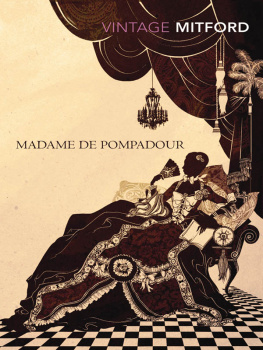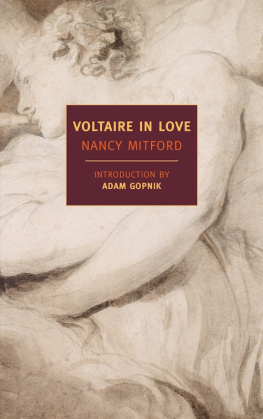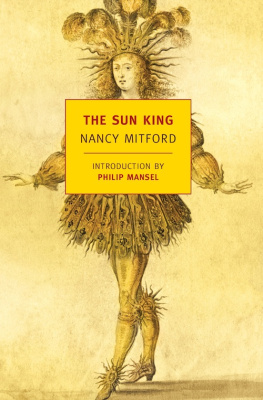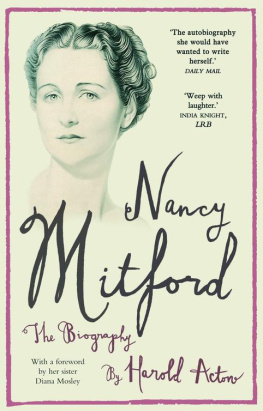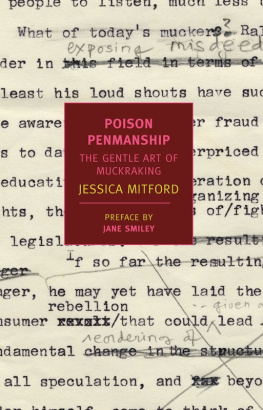Contents
About the Book
When Jeanne-Antoinette was nine, she was told by a fortune teller that she would one day become the mistress of the handsome young Louix XV from that day she was groomed to become a morsel fit for a King. Nancy Mitford lovingly tells the story of how the little girl rose, against a backdrop of savage social-climbing, intrigue, excess and high drama, to become the most powerful women of the eighteenth century French court, Le Pompadour.
About the Author
Nancy Mitford was born in London on November 28 1904, daughter of the second Baron Redesdale, and the eldest of six girls. Her sisters included Lady Diana Mosley, Deborah, Duchess of Devonshire, and Jessica, who immortalised the Mitford family in her autobiography Hons and Rebels. The Mitford sisters came of age during the Roaring Twenties and Thirties in London, and were well known for their beauty, upper-class bohemianism or political allegiances. Nancy contributed columns to The Lady and the Sunday Times, as well as writing a series of popular novels including The Pursuit of Love and Love in a Cold Climate, which detailed the high-society affairs of the six Radlett sisters. While working in London during the Blitz, Nancy met and fell in love with Gaston Palewski, General de Gaulles chief of staff, and eventually moved to Paris to be near him. In the 1950s she began writing historical biographies her life of Louis XIV, The Sun King, became an international bestseller. Nancy completed her last book, Frederick the Great, before she died of Hodgkins disease on 30 June 1973.
ALSO BY NANCY MITFORD
Fiction
Highland Fling
Christmas Pudding
Wigs on the Green
Pigeon Pie
The Pursuit of Love
Love in a Cold Climate
The Blessing
Dont Tell Alfred
Non-fiction
The Sun King
Voltaire in Love
Frederick the Great
NANCY MITFORD
Madame de
Pompadour
1
Versailles and Louis XV
AFTER THE DEATH of the great King, beautiful Versailles, fatal for France, lay empty seven years while fresh air blew through its golden rooms, blowing away the sorcery and bigotry which hung about the walls like a miasma, blowing away the old century and blowing in the new. Louis XIV died in 1715. He had outlived his son, his grandson, and his eldest great-grandson, had reigned seventy-two years, too long for the good of his country. Even then he was so strong that he could not die until half eaten away with gangrene, for which Dr Fagon, killer of Princes, prescribed asses milk. At last the Duc de Bouillon, wearing a black feather, went out on to the balcony and announced to a waiting crowd, curious but not sad, Le Roi est mort. He retired into the palace, put on a white feather, came back and announced Vive le Roi.
The reign of Louis XV had begun; like his great-grandfather he was five years old when he succeeded to the throne of France. He had neither father, mother, brothers nor sisters; all had been killed by the wretched Fagon. He himself would no doubt have followed them to the grave had not his nurse, the Duchesse de Ventadour, hidden him away during that terrible fortnight when the rest of his family was dying of measles, bleeding, purges and emetics. His fathers brother was still alive, but useless as an uncle for a little boy; he was the King of Spain, imprisoned in the etiquette of his own palaces and by now far more Spanish than French. They never saw each other. Louis XV was brought up without the natural family love which should surround a child, without hugs and kisses and without slaps. First of all he must live, Madame de Ventadour used to say and she never allowed him to be crossed. At the age of seven he was taken away from her, crying dreadfully, and handed over to a governor. He then retired into a world of his own, concealing all his thoughts and feelings from those around him, and nobody ever knew much about them for the rest of his life. He was an intensely secret man.
The Regent of France, Philippe, Duc dOrlans, was the next heir to the throne, because the Duc dAnjou had formally renounced his rights to it on becoming King of Spain. People were not wanting who said that the Duc dOrlans had poisoned the heirs of Louis XIV; if so his conduct towards the one that survived was very notable. As soon as his uncle had breathed his last he took the little boy, who stood between him and the throne, away from Versailles and after a few months at Vincennes, established him in the Tuileries Palace, across the road from his own Palais-Royal. For the rest of his life he faithfully served this child. France was at peace; the religious quarrels of the last century had lost their venom, her frontiers were established and no enemy was attempting to cross them; the claim of her King to his throne was unquestionable; the air was full of new ideas. An even greater century than the Grand Sicle might now have been inaugurated, if the Regent had only had the energy to enforce certain changes in the constitution.
As a young man the Duc dOrlans had been intelligent and ambitious; it was one of Louis XIVs grave mistakes that he had allowed him to take so little part in public life. Determined as he was to make the nobles politically impotent, he kept the Princes of the Blood even more strictly in their place. He was too much blinded by his theories to see what a loyal and honourable man his nephew was and how useful he could have been to France. So the Duc dOrlans turned his attention to the pleasures of this life, and a more perfect rake has seldom existed. When, at the age of forty-one, he found himself ruler of France, he was still intelligent, but energy and ambition had been sapped by years of wenching and the cruder forms of dissipation. He did envisage fundamental constitutional changes; he tried to bring back the great nobles into the government of France and to rule by councils instead of bureaucratic secretaries of state. But these lords had lost the habit of being useful; Louis XIV had trained them so well that they had even lost the habit of being a nuisance. The councils fell into the hands of officials and the last serious attempt to bring back aristocratic government in France collapsed. The Regent then settled down to govern as the old King had governed and to bring up the new King to be as much like his ancestor as possible. It was noticed that he even had the same manner towards him, the same deep respect, tinged, however, with love and humour instead of with hatred and fear. He loved the child far more than his own dreary son. He explained every political step to him, saying, You are the master, I am only here to tell you what is happening, to make suggestions, to carry out your orders. The little boy was charmed; he attended the council meetings, clasping in his arms a pet cat which the ministers called his colleague; he was too proud and too shy ever to say a word. This pride and this shyness were to remain with him throughout his life. His only attempt at a protest was when the Regent announced his betrothal to a little Spanish first cousin, a baby Infanta of two. The King cried throughout the whole council, but without making any observations.
When Louis XIV decided, after the civil war known as the Fronde, to keep the great nobles under his eye and to rob them of power, he had cunningly played upon the French love of fashion and fun; all fashion and all fun were gathered together at Versailles. Parisian society, though very middle-class, hummed with life and could be enjoyed from time to time as a change from the Court; the provinces were unthinkable. The heaviest blow that could befall a man was banishment to his estates; this not only meant loss of place and influence; the exile, condemned to live in the country, became ridiculous in the eyes of his friends. Let him embellish his house and garden, let him give expensive parties and make a social and intellectual centre for the whole neighbourhood, the poor man was a dowdy provincial; he counted for nothing any more. The memoirs of the time dramatize to the full these banishments,

